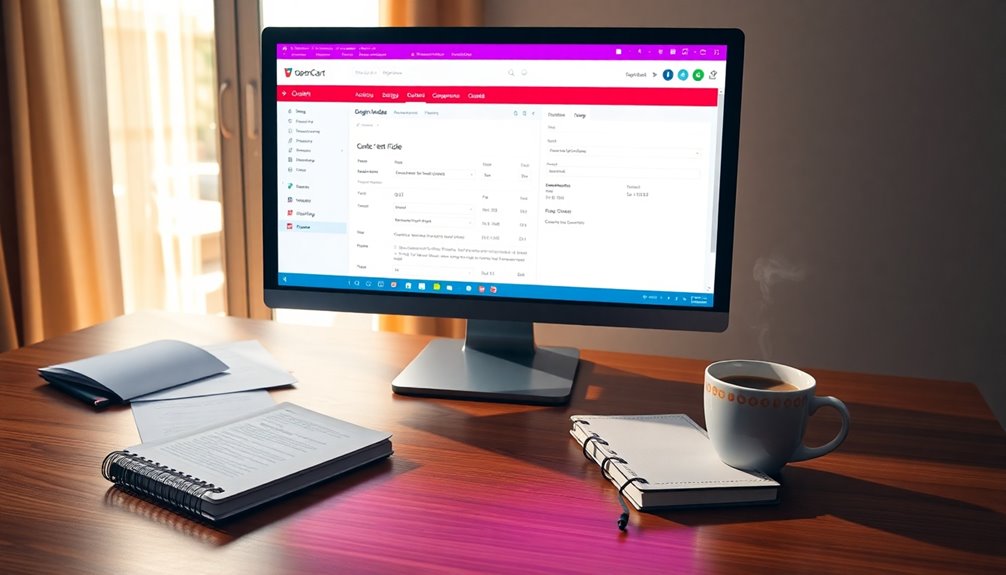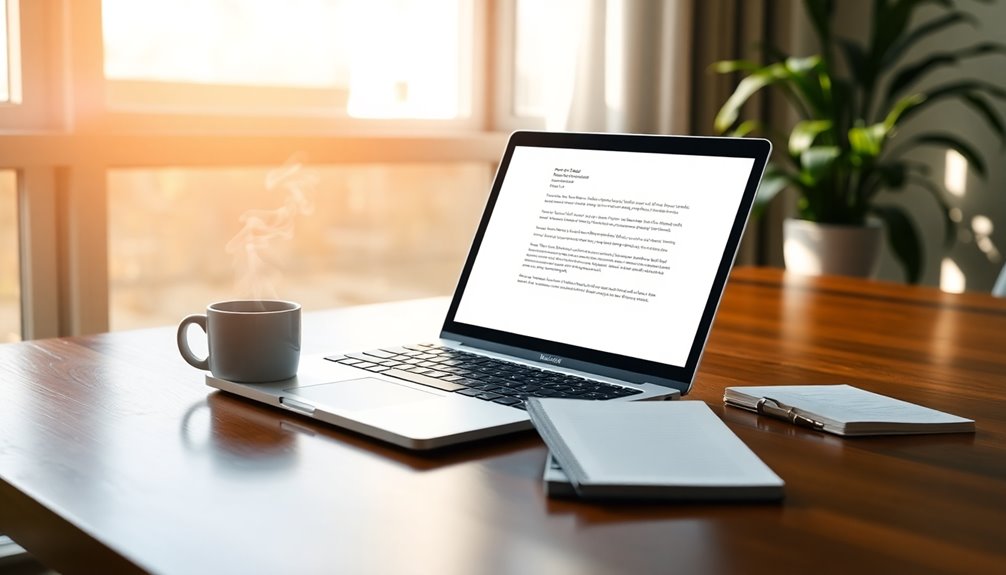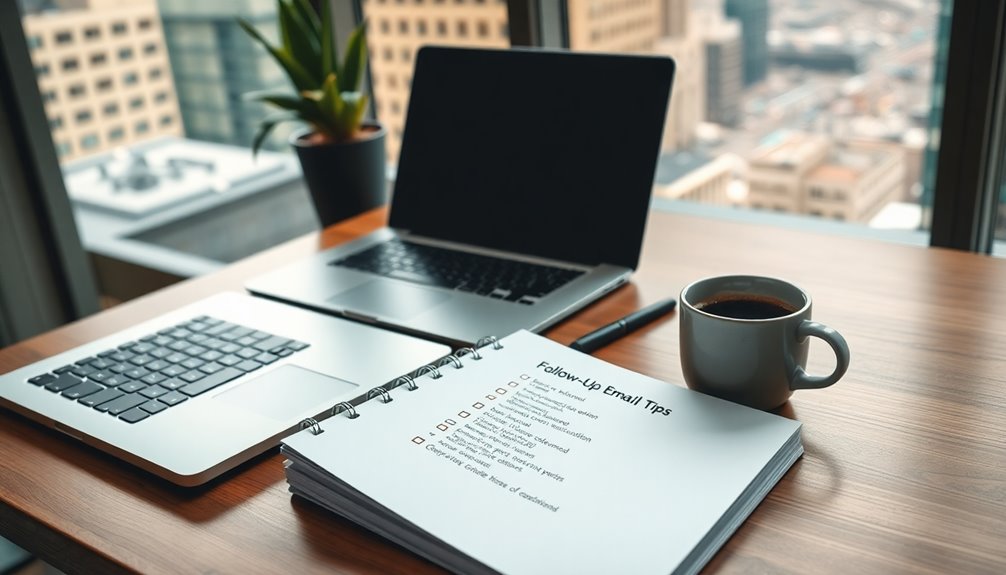To write effective emails to customer service, start with a clear subject line that highlights the issue and includes any relevant order numbers. Use a polite greeting and briefly acknowledge your problem to set a positive tone. Clearly outline the details of the issue and ask specific questions to expedite resolution. Maintain a friendly, personalized tone to build rapport, and don't forget to follow up to show your commitment. This approach can make your communication more efficient and help resolve issues faster. There's plenty more to explore to enhance your email writing skills and improve your customer service experience.
Key Takeaways
- Use a clear, specific subject line that includes relevant details like order numbers to capture attention and streamline the process.
- Begin with a polite greeting and acknowledge the issue to set a positive tone and show understanding.
- Provide a structured outline of the problem, including all necessary details for quicker identification by the customer service team.
- Ask specific questions to gather relevant information upfront and facilitate a faster resolution.
- Follow up regularly to demonstrate commitment and encourage timely responses from customer service representatives.
Introduction
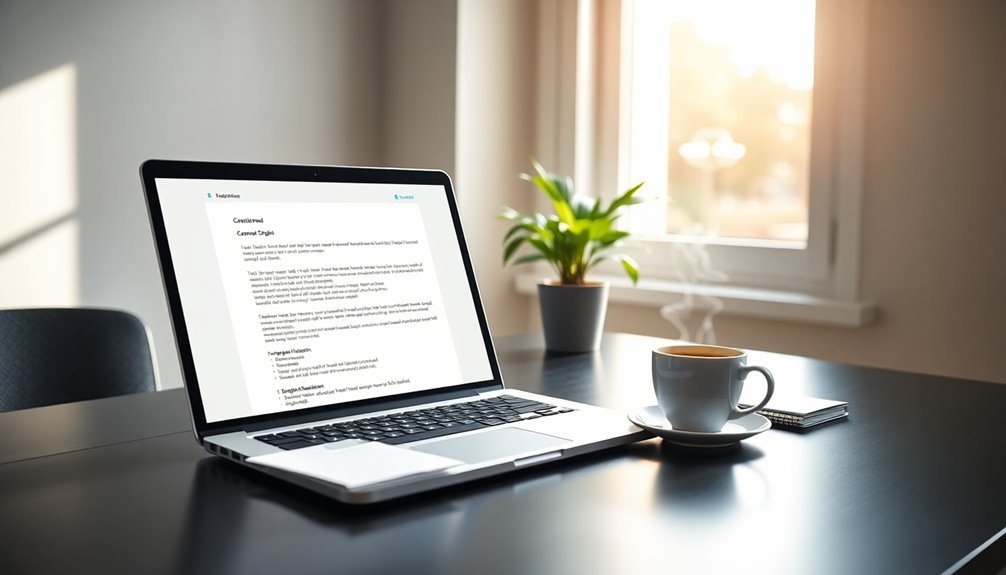
How can you ensure your email to customer service gets the attention it deserves? Start by crafting a clear and concise subject line. Did you know that 47% of email recipients decide whether to open an email based on the subject alone?
Next, include relevant details like order numbers or account information early in your message. This helps representatives quickly identify your problem and expedite resolution.
Don't underestimate the power of a polite tone. When you clearly state your issue while expressing empathy, you foster a positive interaction that encourages faster responses. Personalizing your email by addressing the representative by name can also enhance this connection.
If your issue remains unresolved, following up shows your commitment to resolution. Regular follow-ups can prompt quicker action and might lead to your problem being escalated.
By employing these strategies in your customer service emails, you set the stage for effective communication. Your thoughtful approach not only increases your chances of a satisfactory outcome but also promotes a cooperative atmosphere that benefits both you and the representative.
With the right tactics, you can transform a simple email into a powerful tool for solving problems.
Enhances Customer Relationship Building
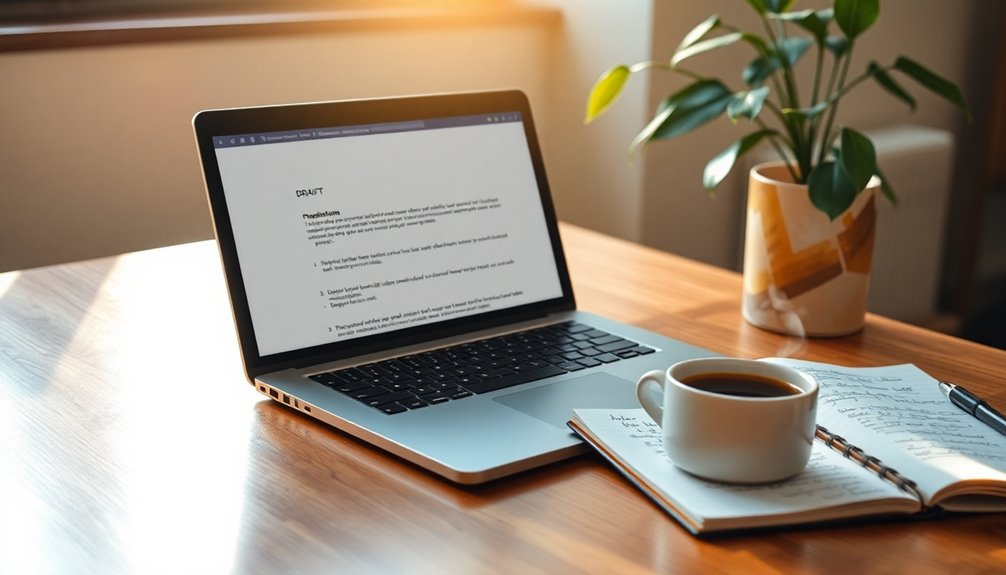
Building strong customer relationships starts with effective communication, and your email to customer service is a key opportunity to foster that connection. Personalizing email responses by addressing customers by name and referencing their specific issues shows that you value them. This simple act can significantly enhance their perception of your service.
When you resolve an issue, don't forget to follow up with customers. This gesture demonstrates your commitment to their satisfaction, fostering trust and encouraging long-term loyalty.
Incorporating empathy in email communications is equally important; acknowledging customers' feelings and frustrations can turn negative interactions into positive experiences, further solidifying relationships.
Utilizing templates that include warm greetings and expressions of gratitude creates a welcoming atmosphere, making customers feel appreciated and valued.
You should also actively solicit feedback through customized surveys or direct inquiries after interactions. This not only shows your dedication to continuous improvement but also enhances customer engagement.
Clear Subject Line

A clear subject line is essential for effective communication with customer service, as it not only captures attention but also sets the expectation for the email's content. When you craft a subject line that reflects the urgency of your issue, like "Urgent: Billing Issue" or "Request for Order Status," it helps customer service prioritize your email and categorize it appropriately. This approach can significantly improve your chances of receiving a prompt resolution.
Including specific details, such as order numbers or account identifiers, in your subject line streamlines the process for customer service representatives. This clarity reduces resolution time and enhances overall communication effectiveness.
Remember, 76% of customers expect consistent interactions, so setting the right tone from the start is crucial.
Using a clear subject line not only aligns you and the service team on the issue at hand but also encourages feedback, making the entire process more efficient. By prioritizing clarity in your subject line, you're taking a vital step toward ensuring that your concerns are addressed quickly and effectively.
Step-by-Step Guide to Complaints
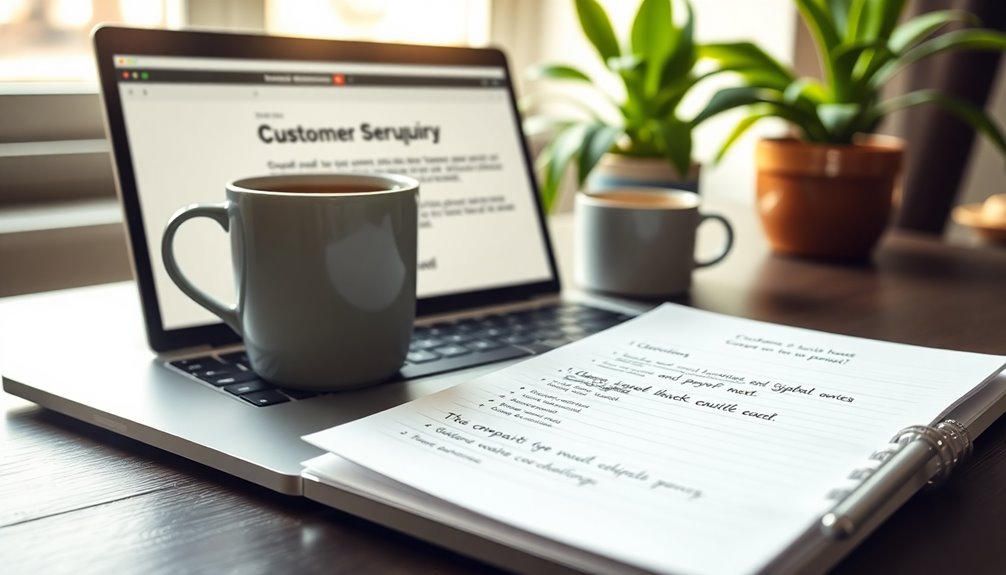
Navigating the complaints process can feel daunting, but following a step-by-step approach can make it manageable.
Start by acknowledging your frustration. When you express this in your email, you validate your feelings and show that you're serious about resolving the issue. This approach can be particularly effective in situations where emotional distress may mirror the effects of emotional abuse.
Next, outline the steps you expect the company to take. This clarity not only helps you understand the process but also sets realistic expectations. When outlining steps, consider including how they might modify their approach based on your feedback for better results.
Throughout your email, use positive language. Maintaining a constructive tone can help diffuse any tension and encourage cooperation from the customer service team.
Be sure to include specific details about your complaint, such as dates, order numbers, or any previous communication. This information demonstrates your commitment to customer satisfaction.
After the issue is resolved, request a resolution confirmation. This ensures you're both on the same page and reinforces their dedication to your experience.
Lastly, don't forget to follow up if you haven't heard back. This step shows that you value the outcome and are invested in a positive resolution. Also, recognizing signs of stagnation in customer service communication can help you determine when to escalate your complaint for faster resolution.
Dos and Don'ts for Complaint Emails
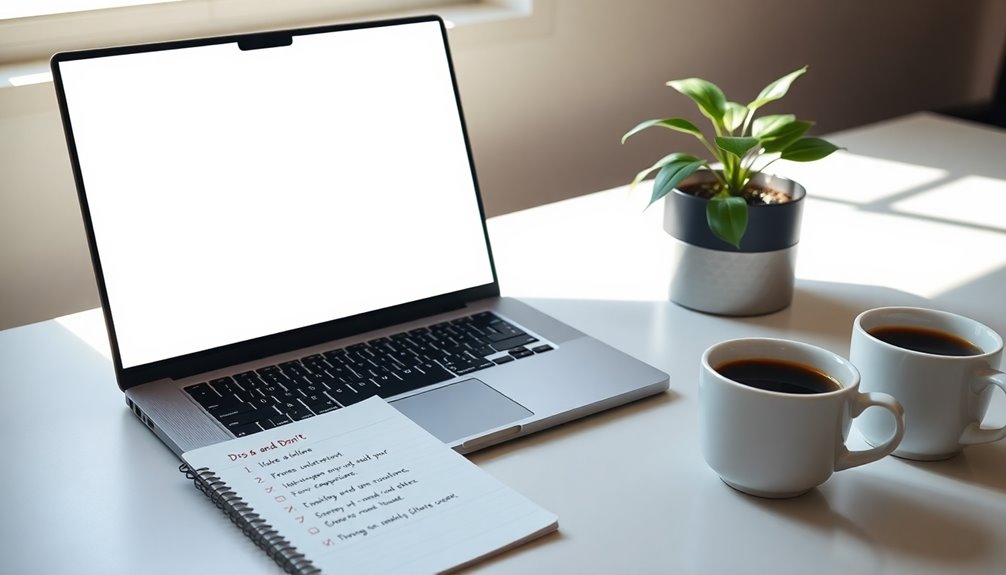
When crafting a complaint email, your approach can make all the difference in the resolution process. First, always acknowledge the customer's feelings. Expressing empathy toward their frustration validates their experience and fosters a positive tone in your communication. This simple gesture can help de-escalate tensions. Additionally, offering support strategies can help customers feel more understood and valued.
Next, provide clear instructions on how you plan to resolve their issue. Customers appreciate knowing the steps you're taking on their behalf. Avoid using defensive language or blaming the customer, as this can worsen frustration and hinder effective communication.
Timely responses are crucial. A prompt reply shows your commitment to resolving customer complaints, significantly impacting their satisfaction. If you delay, it may create more frustration and diminish trust. Additionally, consider creating a retirement savings plan that incorporates customer feedback to continuously improve your service.
Examples of Complaint Response Emails
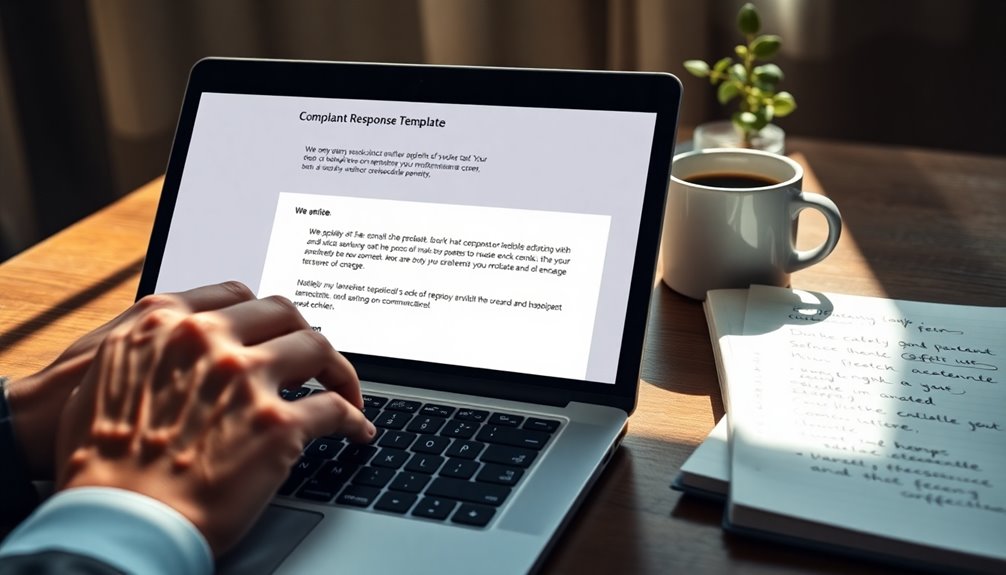
Crafting effective complaint response emails can significantly enhance customer satisfaction and loyalty. Start by acknowledging the customer's frustration with a sincere apology email. For instance, you might say, "I'm sorry to hear about the problems you faced with your recent order." This validates their feelings and sets a positive tone.
Next, provide a clear outline of the steps you're taking to resolve the customer issue. For example, "We're currently investigating your complaint and expect to have a resolution within 48 hours." This keeps customers informed and reassured that their concerns are being addressed.
Incorporate a personalized touch by using the customer's name and referring to details from their complaint. This shows that you genuinely care.
Additionally, consider offering a goodwill gesture, such as a discount or free shipping on their next purchase, to improve customer satisfaction. Recognizing the importance of open communication about feelings during stressful situations can also enhance the customer's experience and foster trust.
Pro Tips for Writing Effective Emails
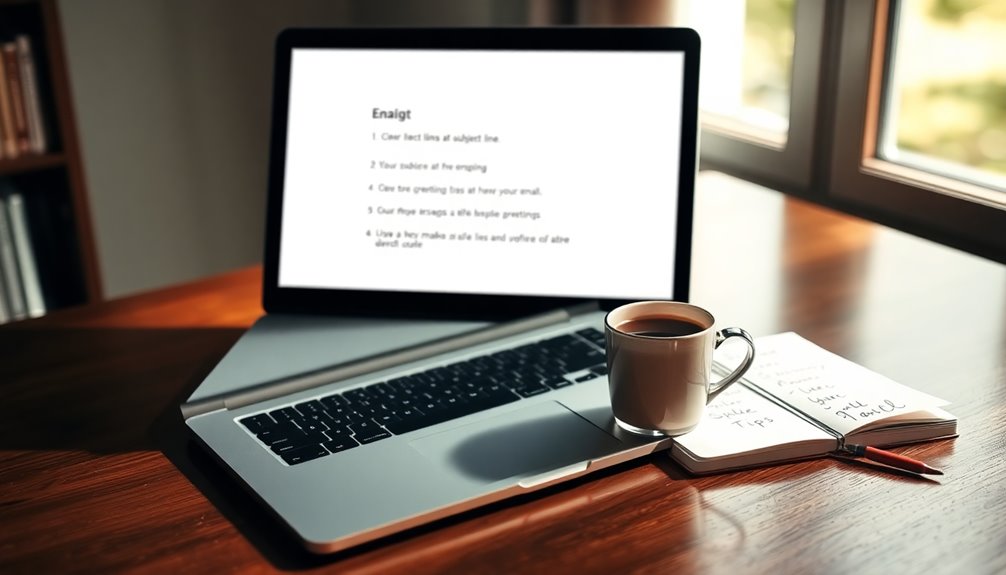
Effective email communication can make all the difference in customer service interactions. Start with a clear and concise subject line that summarizes your issue, as nearly half of recipients decide whether to open an email based on it.
Follow up with a polite greeting to set a positive tone, and directly acknowledge the customer's issue to foster understanding.
Provide structured information by outlining the problem clearly. Including necessary details helps customer service agents identify and address your concerns faster.
Don't forget to include specific questions; this ensures all relevant information is gathered upfront, which can expedite problem resolution.
Ending with a positive closing statement encourages further communication and reinforces the importance of customer feedback and engagement.
Express gratitude for their attention to your issue and invite them to reach out with any additional questions or updates. Additionally, utilizing advanced technology for monitoring can help ensure that customer service interactions remain smooth and effective.
By following these pro tips, you'll enhance your email effectiveness, leading to quicker resolutions and a more satisfying customer service experience.
Final Thoughts

Ultimately, mastering the art of writing emails to customer service can significantly enhance your overall experience. When you reach out to customer service, remember that your communication should be clear and concise. Use templates that promote quick responses, and don't forget to personalize your emails by addressing the customer service representative by name and mentioning your specific concerns. This fosters trust and increases the chances of receiving helpful assistance.
Active listening is crucial in this process. Validate the representative's efforts and express empathy, as it can help defuse any frustration you might feel. Clear subject lines and straightforward messaging not only assist the representative in understanding your issue but also speed up problem resolution. Additionally, utilizing effective email marketing strategies can improve the overall communication process.
After your issue is resolved, consider sending a follow-up email. This shows your commitment to the service experience and allows you to provide feedback, ensuring any lingering concerns are addressed.
Frequently Asked Questions
How Do You Write an Email for Resolving Issues?
To write an effective email for resolving issues, start by clearly stating your problem, including any relevant details like order numbers.
Keep your tone polite and respectful to encourage cooperation.
Mention any previous interactions to provide context, showing your commitment.
Clearly request specific solutions or actions you'd like, guiding the customer service team.
How Do You Write a Good Customer Service Response Email?
To write a good customer service response email, start by acknowledging the customer's issue and validating their feelings.
Use clear, concise language to explain your resolution steps, ensuring they understand the process.
Personalize your response by addressing them by name and referencing their specific situation.
Encourage them to reach out with further questions, showing your commitment to their satisfaction.
How to Write a Formal Email to Customer Service?
When you write a formal email to customer service, start with a clear subject line that summarizes your issue.
Greet them politely, then state your purpose right away.
Provide all relevant details, like order numbers and dates, to help them understand your problem better.
Maintain a respectful tone throughout, and finish with a clear call to action, specifying what you'd like them to do, and include your contact information for follow-up.
How to Write an Email to a Helpdesk Example?
When you write an email to a helpdesk, start with a clear subject line that summarizes your issue.
Acknowledge their support, setting a positive tone. Clearly describe the problem and include relevant details like account info or error messages.
Mention any steps you've already taken to resolve the issue.
Finally, express appreciation for their help and invite them to reach out if they need more information.
This approach encourages quick and effective responses.

